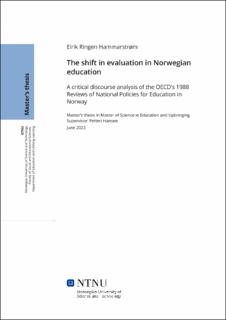| dc.contributor.advisor | Hansen, Petteri | |
| dc.contributor.author | Hammarstrøm, Eirik Ringen | |
| dc.date.accessioned | 2023-09-19T17:21:00Z | |
| dc.date.available | 2023-09-19T17:21:00Z | |
| dc.date.issued | 2023 | |
| dc.identifier | no.ntnu:inspera:146604546:98326662 | |
| dc.identifier.uri | https://hdl.handle.net/11250/3090606 | |
| dc.description.abstract | Denne masteroppgaven er en kritisk diskursanalyse av temaet evaluering i: Reviews of National Policies for Education (1990), en rapport OECD skrev etter et besøk i Norge for å evaluere den norske utdanningspolitikken. I oppgaven diskuterer jeg OECD-eksaminatorenes oppfordring til mer evaluering på alle utdanningsnivåer. Jeg fokuserer på hvordan denne oppfordringen gjøres og hvordan den er diskursivt legitimert. Policy borrowing and lending har fungert som en teoretisk ramme der rapporten er analysert. Jeg analyserer og diskuterer teksteksempler etter Norman Faircloughs metodologi for kritisk diskursanalyse, for å få innsikt i hvordan evaluering er et hegemonisk tema i OECD-rapporten. Jeg inkluderte også et retorisk aspekt ved analysen i et forsøk på å utvide omfanget av analysen, for å få et klarere bilde av hvordan teksten er både påståelig og overbevisende. Hovedfunnene i denne oppgaven er at evaluering presenteres som en løsning på mange utfordringer i norsk utdanning på alle nivåer. Eksaminatorene gir også uttrykk for behov for selvkritikk og selvevaluering på lokalt nivå, men ved å understreke behovet for å etablere et informasjons- og evalueringssystem knytter de også disse ideene til nasjonalt nivå. | |
| dc.description.abstract | This master’s thesis is a critical discourse analysis of the subject of evaluation in: Reviews of National Policies for Education (1990), a report the OECD wrote after a visit to Norway to evaluate the Norwegian educational policies. In the thesis I discuss the OECD examiners’ urging more evaluation in all levels of education. I focus on how this urging is done and how it is discursively legitimated. Policy borrowing and lending has served as a theoretical frame in which the report has been analysed. I analyse and discuss textual samples following Norman Fairclough’s methodology of critical discourse analysis, to gain insight into how evaluation is a hegemonic theme in the OECD report. I also included a rhetorical aspect to the analysis in an attempt to broaden the scope of analysis, so as to get a clearer picture of how the text is both assertive and persuasive. The main findings in this thesis are that evaluation is presented as a solution to many challenges in Norwegian education on all levels. The examiners also express the need for self-criticism and self-evaluation on a local level, but by emphasising the need to establish an information and evaluation system, they also relate these ideas to the national level. | |
| dc.language | eng | |
| dc.publisher | NTNU | |
| dc.title | The shift in evaluation in Norwegian education | |
| dc.type | Master thesis | |
